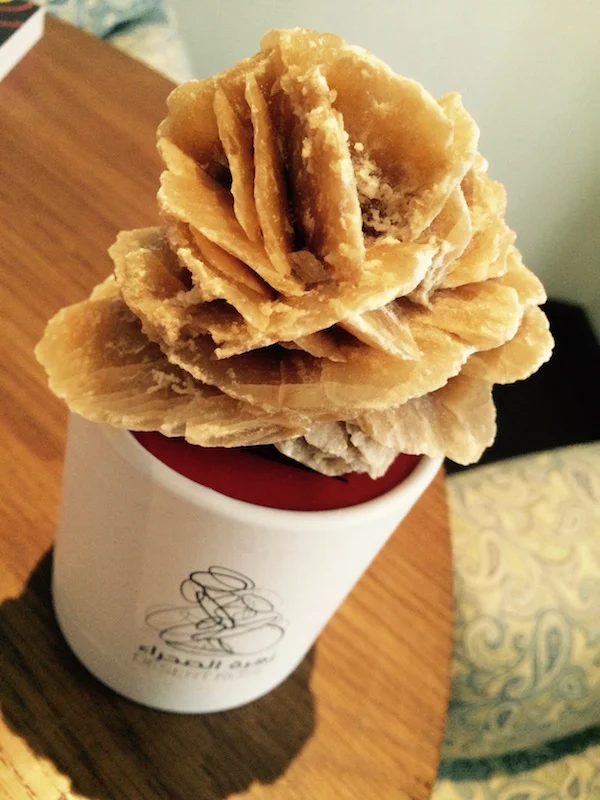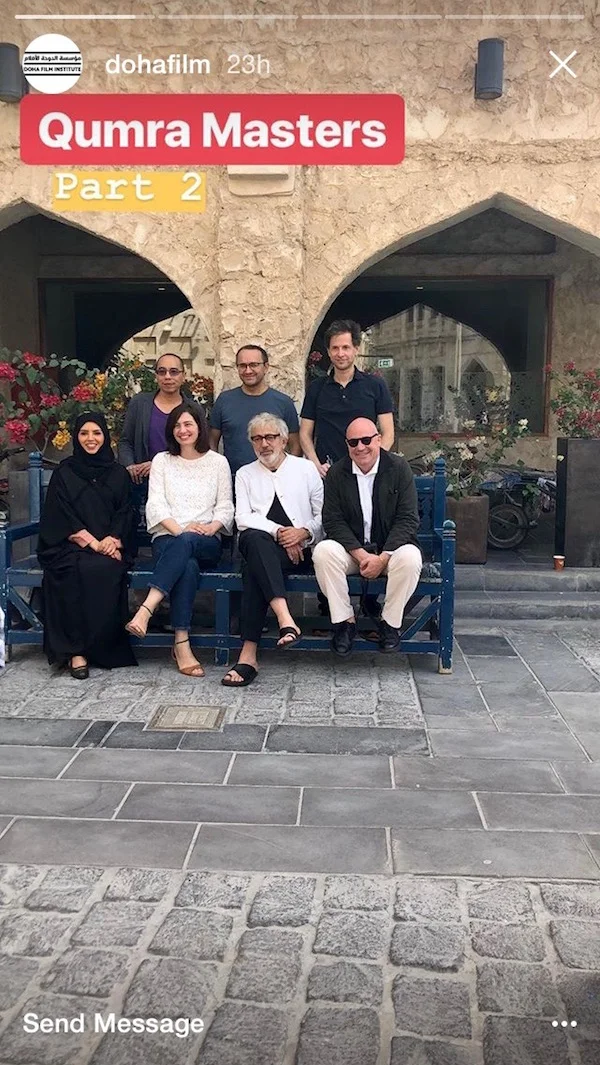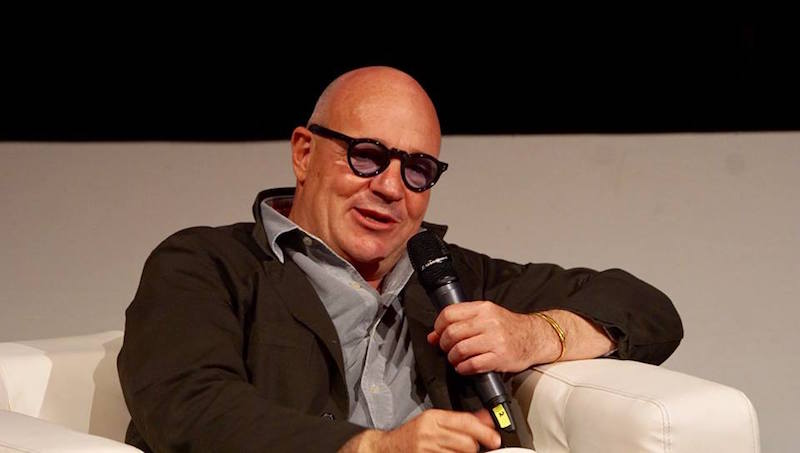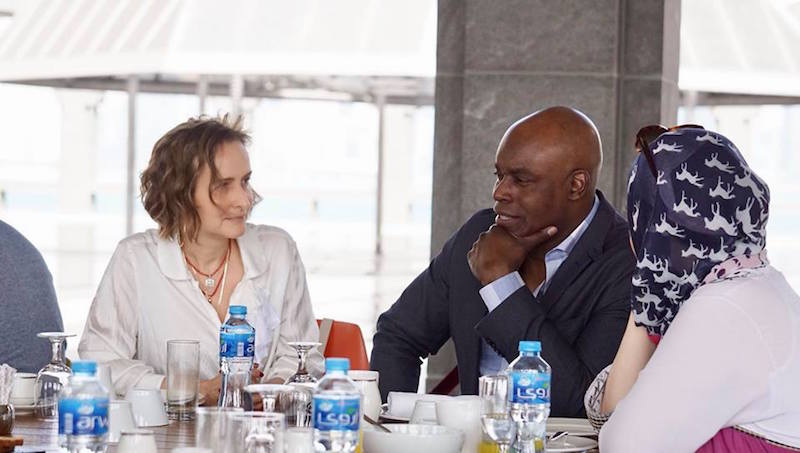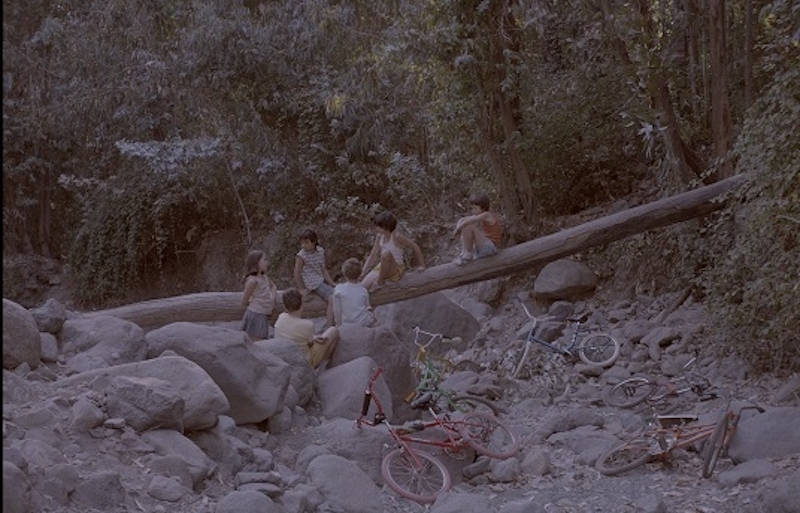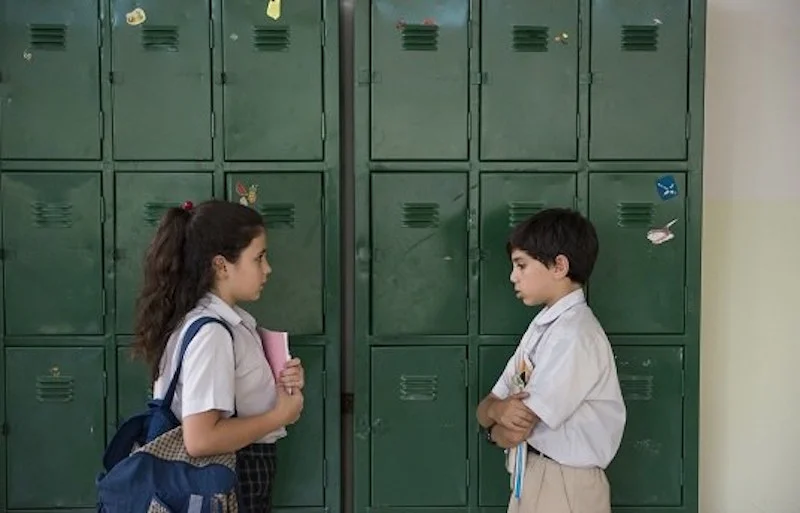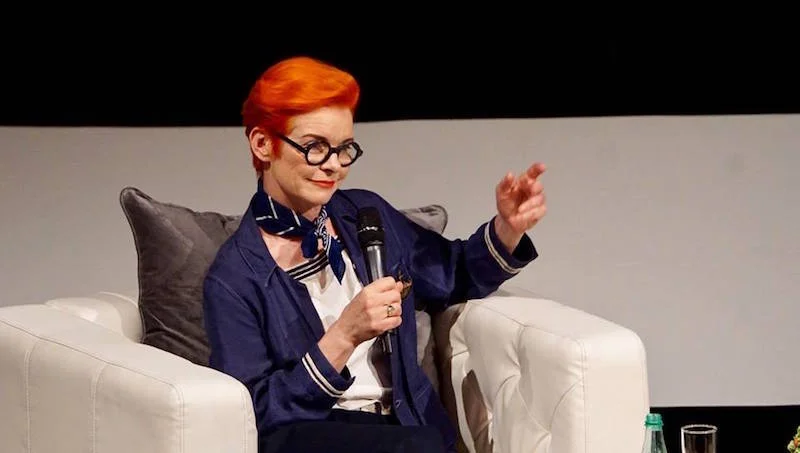As of my very first steps at this year's Qumra, around the Souq Waqif, spent inside the Date Market fair and eating a bowl of fragrant Moroccan fava bean soup at a nearby restaurant, to my very last moments wandering inside Hamad International Airport drinking an espresso with a fellow journalist, Doha unrelentingly offered me the very best she has to give. And that's pretty darn sensational in a country that can count culture, fashion and heritage at the top of its list of priorities.
A "desert rose" courtesy of the Doha Film Institute
From the brand new, still partly in construction National Museum of Qatar rising out of the sands, and shaped like a desert rose, the crystallized rock that is formed when lightning hits the dunes, to the institution of the Museum of Islamic Art, where most of the Qumra events and masterclasses were held, to the leisurely, harass-free environment of the Souq itself, I felt like I was being coddled in a cocoon of culture and learning, one that would definitely remain with me for months to come.
Doha Film Institute's CEO Fatma Al Remaihi and Tilda Swinton pose at the Museum of Islamic Art -- with the Qumra 2018 projects filmmakers in the background.
Photo courtesy of DFI
And even if I ever wanted to forget Doha, as they say, I can't. The upcoming Cannes Film Festival will definitely feature films supported by the organization -- some of the filmmakers in the running were present at Qumra -- the CEO of the Doha Film Institute Fatma Al Remaihi is featured on every "Best Dressed List" from her appearance at the Oscars this year, and the kind of chance meetings and incredible moments I collected during the six-day-long event are enough to inspire at least a year of writing -- both in Italian and English for me.
Above all, there were many lessons I walked away with after spending a week in Doha.
From Fatma Al Remaihi herself, I leaned what makes Qumra tick and why the event, after its fourth edition, remains one of the most coveted lab of creativity for filmmakers to attend in the entire Middle East.
From left, Fatma Al Remaihi, Apichatpong Weerasethakul, Hanaa Issa, Andrey Zvyagintsev, Elia Suleiman, Bennett Miller and Gianfranco Rosi
Photo courtesy of DFI's Instagram account @DohaFilm
“We are always very conscious when we pick this bouquet of flowers, as Elia puts it,” Al Remaihi admitted during a brief afternoon chat with the attending international media, “to have as diverse a selection of people. It’s not easy to put together this selection every year. And then it works. It’s so inspirational for all of us.”
Artistic advisor to the Doha Film Institute Elia Suleiman also put it quite perfectly by saying, “you have to imagine a little verse being written by a few people. We leave a lot of space for things to fall into place. Take risks. Initiate by some sort of departure and watch it rhyme in an interesting and experimental fashion.”
Al Remaihi added in more words of wisdom when she said “for Qumra I would never say never to anything,” which explains the accepting vibe of the event, where everyone’s opinion is welcomed and no question goes unanswered.
Gianfranco Rosi
Photo courtesy of the Doha Film Institute
From Qumra Master Gianfranco Rosi I learned about courage and self preservation — which combined, of course form the very core of our human experience. With his latest work 'Notturno' which he is currently filming around the Middle East, the Maestro will undoubtedly uncover rarely seen places and yet undiscovered human themes, seen from his special POV and all within a setting which at the moment, isn’t the safest to travel through. Yet Rosi seems to have found a balance for his work, an almost meditative method of filmmaking and through another documentary I watched just before flying to Doha — ‘Hondros’ by Greg Campbell about the late photojournalist Chris Hondros — I learned that for someone documenting humanity at large, being alone can be the safest way to travel. Inshallah. And the unrivaled best for experiencing life.
With Cameron Bailey, photo courtesy of DFI
From Cameron Bailey the charismatic artistic director of the Toronto International Film Festival, came another lesson, this one about the time and place for watching a film. I knew instinctually that many a time, I have enjoyed a particular movie more than others did because I managed to watch it in the perfect theater, sitting next to the ideal viewing companion. But Bailey took it one step further. He admitted to watching Hitchcock’s ‘Vertigo’ and the works of Wong Kar-wai whenever his soul needs soothing, but didn’t laugh at me when I confessed that I’d broken down at Kenneth Branagh’s performance as Hercule Poirot on the plane. Instead, he offered the theory discussed in this 2013 article from 'The Atlantic', in which Elijah Wolfson points to our vulnerability up in the sky. “It’s a real thing, something happens to us and we get more emotional, away from our loved ones, at 30,000 feet in the air,” said Bailey, kindly justifying what seemed to me more like my own sentimental shortcoming.
A still from 'Late to Die Young' by Dominga Sotomayor
When I sat across from Chilean filmmaker Dominga Sotomayor, at a working lunch inside The Village, a restaurant I can best describe as "eclectic cuisine," she talked about her latest feature ‘Late to Die Young’. Her enterprising spirit — her company has plans to open a cinema house in Santiago later this year — and kindness were infectious. I relished our chat where she also explained the importance of Qumra by pointing to their connection-making factor. It was a jolt of pride when I saw an article published just days after our lunch pointing to her film as a Cannes line-up favorite from South America. Sotomayor’s lesson to me was offered by the chance to observe her as she connected to others and just how humble she is for such a cinematic powerhouse.
A still from '1982' by Oualid Mouaness
During the same lunch, I also managed to catch up with Lebanese director and screenwriter Oualid Mouaness whose exciting work in progress narrative feature ‘1982’ was also one of this year’s Qumra featured projects. I'll have to wait a bit till I can watch his latest, a coming of age story set in the years of the 1982 Lebanon war, but I did manage to convince him to send me his 2016 short 'The Rifle, The Jackal, The Wolf And The Boy' which I'll watch at the perfect moment, and wearing a good set of headphones for the perfect sound -- as Mouaness advised.
Sandy Powell
Photo courtesy of the Doha Film Institute
From the last of the Qumra 2018 Masters, multi-Oscar winning costume designer Sandy Powell, it wasn't so much about learning a new lesson, rather rediscovering a tried and true one for me -- the power of grace and elegance, both qualities which she possesses. As film curator Richard Peña glided through samples of her work on films such as 'Shakespeare in Love', 'Gangs of New York' and 'Velvet Goldmine' Powell uttered, after being prompted from the audience, a very special sentence. "Most of the times, we are not making documentaries," she said, about her work and how much creative license she allows herself. And in fact, that's the lesson for filmmakers of the future, to stop thinking like what they are making needs to mirror, and always look like real life. Because, it turns out, some of the greatest documentary filmmakers, like Rosi for example, think like poets, not photojournalists.
At the Souq in Doha, I learned how incredibly close we can all be to each other and yet leave enough personal space to respect all of humanity. Even on a insanely crowded Friday night inside Souq Waqif I found myself gliding through the colorful pet market, the streets lined with cafes and through the back alleys with the local women selling their homemade food, without ever feeling harassed or personally invaded. It’s a sensation that I shall carry around forever, a wonderful sensory memory of a city, a country which is truly magical and built on intelligent ideas and a respect for heritage, paired with a worldly vision.
Then in the desert, traveling through the dunes guided by our daredevil Qatari driver, to the sounds of American rap -- on the final day of Qumra -- I figured out what makes this world of cinema so special. It’s the ability of the filmmakers to tell the stories that each of us carry inside our hearts, yet finding a way to immerse us deep into their imaginary worlds too.
But perhaps the lesson which was the most important for me, at this moment of personal transition, is what the Masters, each and every one hinted to -- their feeling freest when they give themselves permission to quit their work. From Tilda Swinton to Rosi, to Bennett Miller and even Apichatpong Weerasethakul, it seems that the freedom to say ENOUGH! is what we all crave to truly love our craft.

